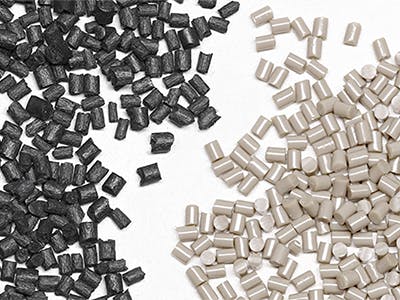Why Compliance Matters for Food Contact Materials: Q&A with Head of Regulatory Affairs and Product Stewardship
Food and beverage manufacturers are facing increasing demands for health and safety, hygiene, and productivity. The pressures are mounting:
Food contact legislation; Cleaning processes; Equipment performance; Precision; Efficiency - improvements need to be made without compromising safety, reliability, costs, or output.
Caroline Prisk who is leading the Regulatory Affairs and Product Stewardship (RAPS) team at Victrex talks about what compliance means to food contact materials and applications, and why it matters.
Are polymers common materials used in food-related industries and applications?
Polymers are widely used in multiple applications across the food supply chain from food and beverage manufacturing and processing to packaging or for cookware. High-performance polymers such as PEEK applied in food contact applications may help improve productivity and reliability.

As the polymer comes into contact with the ingredients and processed food, it is critical to ensure that the materials used meet appropriate safety standards.
Can you explain more about how food contact materials are defined?
Per the European Food Safety Authority (EFSA), food contact materials are all materials and articles intended to come into contact with food, such as packaging and containers, kitchen equipment, cutlery, and dishes.
These also include materials used in processing equipment, such as coffee makers or production machinery, as well as the containers used to transport foodstuffs.
Food contact materials can be made from a variety of materials including plastics, rubber, paper, and metal, among others.
How is it ensured that food contact materials are safe?
There are global standards in place for food contact materials and substances to safeguard consumer safety and health.
There’s also ongoing research and discussion on certain food contact materials for their safety as well as newly developed materials. The reviews and updates take place regularly and all must comply with the latest regulations and requirements.
For example, all food contact materials sold, imported, or manufactured in the EU must comply with the European Framework Regulation (EC) No 1935/2004 on materials and articles intended to come into contact with food.

EU Commission Regulation (EU) No. 10/2011 sets out safety requirements for manufacturing, testing, and assessing the safety of food contact plastic materials and articles mentioned in Regulation (EU) No. 1935/2004.
It includes the list of raw materials allowed in the production of plastic food contact materials and the test methods that must be used to demonstrate the compliance of the materials.
The regulation states that food contact materials may not release any constituents into the food in such quantity that could be harmful to human health or cause an unacceptable change in the composition, taste, or smell of the food.
A specific testing plan must be prepared for each material specifically, based on the intended end use of the product and the raw materials used to manufacture it.
Other global food contact standards and regulations include US FDA 21 CFR 177 for polymers intended for food contact and China GB 4806.1 General Safety Requirements on Food Contact Materials and Articles.
Why do you think compliance is so important for food contact applications?
The regulatory requirements globally continue to become more complex and it is getting more difficult to choose the appropriate material for the right application. In addition, the consumer has been bombarded with information regarding safety and health risks associated with certain materials and products.
The increasing safety and health concerns are driving manufacturers to increase their efforts towards ensuring compliance with all applicable regulations set forth by governing bodies such as the FDA (Food & Drug Administration), and the US EPA (Environmental Protection Agency). One of the biggest challenges facing manufacturers today is meeting regulatory requirements whilst maintaining high quality standards at an affordable cost.
Compliance with applicable regulations and standards provides assurance that a material or product meets applicable requirements from a health and safety perspective. It helps manufacturers to maintain consumer confidence in their products.
At Victrex, the Regulatory Affairs and Product Stewardship (RAPS) team works towards ensuring that our products meet applicable regulatory requirements and compliance is maintained.
VICTREX FG™ series is compliant with major food and water contact regulations and standards. Safe in the knowledge that these materials comply with applicable regulatory requirements, product managers, designers, engineers, and project managers can use the series to facilitate their design choices.
About the author
Caroline is a highly experienced regulatory affairs leader, having held senior roles in industry. She holds an MSc in Medical Engineering from Imperial College, London. At Victrex, Caroline is Head of Regulatory Affairs and Product Stewardship and leads a team of regulatory experts across Europe, USA, and Asia. She ensures that Victrex products maintain compliance with applicable global regulations.
About the author





